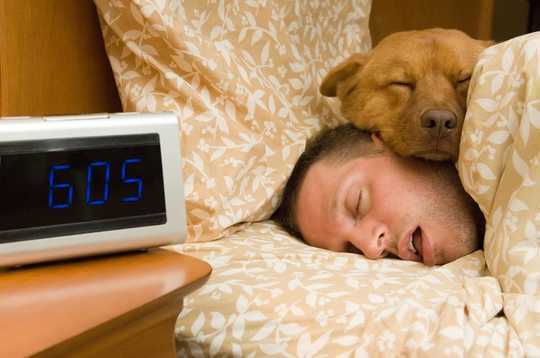
While a full night of deep sleep stabilizes emotions, a sleepless one can trigger up to a 30% rise in anxiety levels, a new study shows.
Researchers have found that the type of sleep most apt to calm and reset the anxious brain is deep sleep, also known as non-rapid eye movement (NREM) slow-wave sleep, a state in which neural oscillations become highly synchronized, and heart rates and blood pressure drop.
“We have identified a new function of deep sleep, one that decreases anxiety overnight by reorganizing connections in the brain,” says Matthew Walker, professor of neuroscience and psychology at the University of California, Berkeley and senior author of the paper, published in Nature Human Behavior.
“Deep sleep seems to be a natural anxiolytic (anxiety inhibitor), so long as we get it each and every night.”
Get The Latest By Email
The findings provide one of the strongest neural links between sleep and anxiety to date—and also point to sleep as a natural, non-pharmaceutical remedy for anxiety disorders. Health experts have diagnosed anxiety disorders in some 40 million American adults and they are rising among children and teens.
“Our study strongly suggests that insufficient sleep amplifies levels of anxiety and, conversely, that deep sleep helps reduce such stress,” says lead author Eti Ben Simon, a postdoctoral fellow in the Center for Human Sleep Science.
Deep sleep lowers anxiety
In a series of experiments using functional MRI and polysomnography, among other measures, researchers scanned the brains of 18 young adults as they viewed emotionally stirring video clips after a full night of sleep, and again after a sleepless night. Researchers measured anxiety levels following each session via a questionnaire known as the state-trait anxiety inventory.
After a night of no sleep, brain scans showed a shutdown of the medial prefrontal cortex, which normally helps keep our anxiety in check, while the brain’s deeper emotional centers were overactive.
“Without sleep, it’s almost as if the brain is too heavy on the emotional accelerator pedal, without enough brake,” Walker says.
After a full night of sleep, during which researchers measured participants’ brain waves via electrodes placed on their heads, the results showed anxiety levels declined significantly, especially for those who experienced more slow-wave NREM sleep.
“Deep sleep had restored the brain’s prefrontal mechanism that regulates our emotions, lowering emotional and physiological reactivity and preventing the escalation of anxiety,” Simon says.
Even subtle sleep changes matter
Beyond gauging the sleep-anxiety connection in the 18 original study participants, researchers replicated the results in a study of another 30 participants. The results again showed that those who got more nighttime deep sleep experienced the lowest levels of anxiety the next day.
Moreover, in addition to the lab experiments, the researchers conducted an online study in which they tracked 280 people of all ages about how both their sleep and anxiety levels changed over four consecutive days.
The results showed that the amount and quality of sleep the participants got from one night to the next predicted how anxious they would feel the next day. Even subtle nightly changes in sleep affected their anxiety levels.
“People with anxiety disorders routinely report having disturbed sleep, but rarely is sleep improvement considered as a clinical recommendation for lowering anxiety,” Simon says. “Our study not only establishes a causal connection between sleep and anxiety, but it identifies the kind of deep NREM sleep we need to calm the overanxious brain.”
On a societal level, “the findings suggest that the decimation of sleep throughout most industrialized nations and the marked escalation in anxiety disorders in these same countries is perhaps not coincidental, but causally related,” Walker says. “The best bridge between despair and hope is a good night of sleep.”
Here are five tips for a restorative night’s sleep:
- Go to bed and wake up at the same time every day, even after a bad night’s sleep or on the weekend.
- Keep your bedroom temperature cool; about 65 degrees Fahrenheit is optimal for cooling your body toward sleep. Wear socks if your feet are cold.
- An hour before bedtime, dim the lights and turn off all electronic screens and devices. Blackout curtains are helpful.
- If you can’t sleep, get out of bed and do something quiet and relaxing until the urge to sleep returns. Then, go back to bed.
- Avoid caffeine after 1 PM and never go to bed tipsy. Alcohol is a sedative, and sedation is not sleep. It also blocks your REM dream sleep, an important part of the sleep cycle.
About the Authors
Lead author Eti Ben Simon, a postdoctoral fellow in the Center for Human Sleep Science. Senior author, Matthew Walker, professor of neuroscience and psychology at the University of California, Berkeley.
books_health







